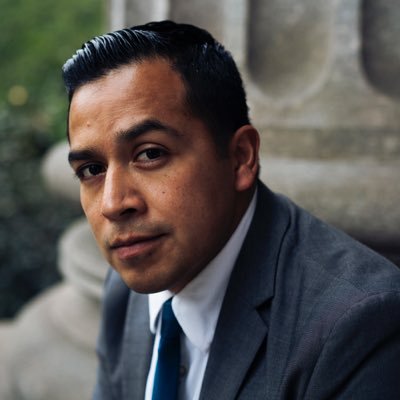New York’s First Undocumented Lawyer: ‘We All Have a Voice’
Date: February 1, 2018
In 2016, Cesar Vargas became New York state’s first openly undocumented lawyer. It was a major personal accomplishment for Vargas, whose mother brought him to the United States when he was 5 years old, and for New York, which became the third state in the nation to allow undocumented immigrants to practice law. “We find that Mr. Vargas’s undocumented immigration status, in and of itself, does not reflect adversely upon his general fitness to practice law,” read the unanimous opinion from the Appellate Division of the State Supreme Court in 2015, noting that, as a Dreamer, Vargas did not violate the nation’s immigration laws “of his own volition.”
 Vargas was born into a poor family in Puebla, Mexico. The family shared a one-room home with no windows and at times subsisted on stale bread. Vargas’s father died when he was 3 years old, and two years later his mother decided to seek a better life for her children and cross the border. A photo from that time shows her holding plastic bags containing everyone’s birth certificates, school records, and medical records. “For me now, looking back, that plastic bag was the start of our new life,” Vargas says. “We risked everything to have a better life. She was widowed, alone, and didn’t speak English. I think my mom is an original Dreamer.”
Vargas was born into a poor family in Puebla, Mexico. The family shared a one-room home with no windows and at times subsisted on stale bread. Vargas’s father died when he was 3 years old, and two years later his mother decided to seek a better life for her children and cross the border. A photo from that time shows her holding plastic bags containing everyone’s birth certificates, school records, and medical records. “For me now, looking back, that plastic bag was the start of our new life,” Vargas says. “We risked everything to have a better life. She was widowed, alone, and didn’t speak English. I think my mom is an original Dreamer.”
In Brooklyn, Vargas’s mother sold tamales in the street, worked as a nanny, even picked up cans for the recycling money. “Back then, for me it was embarrassing to see my mom collecting cans from the garbage,” Vargas says. “But now I really, really appreciate what she did — the courage, and the hard work an immigrant mother does to give her kids a better life.”
She would tell Vargas: “A family always needs to have a lawyer and a doctor: One to take care of the family’s health, and the other to defend it.” Vargas knew by high school that he wanted to be a lawyer. “I wanted to defend my community, give back,” he says. “We need to get ahead not for ourselves, but for each other and for the communities that support us.”
I wanted to defend my community, give back. We need to get ahead not for ourselves, but for each other and for the communities that support us.
Vargas never let his undocumented status hold him back. He studied philosophy at St. Francis College, in Brooklyn, graduating with honors, and earned a law degree from the City University of New York in 2011, passing the bar on his first attempt the same year. At the same time, he worked as an unpaid intern for the Kings County District Attorney and a State Supreme Court judge. When he applied for admission to the bar in 2012, however, the bar’s Committee on Character and Fitness rejected it based on his immigration status, and sent the question to the court for a decision.
It would be three years before the court ruled in Vargas’ favor. At his swearing-in ceremony, in 2016, his mother wept, telling a reporter: “Because . . . the child that I took by the hand crossing the border is now a lawyer.”
While waiting for his license, Vargas worked as an organizer for immigration reform, founding the Dream Action Coalition and serving as an adviser on immigration policy and Latino issues for Sen. Bernie Sanders’ 2016 presidential campaign. “It’s important to have a presence in Washington, DC, but at the end of the day, all political power is local, all progress is local,” Vargas says. “We cannot forget the real work that needs to be done in our cities, our states, and neighborhoods.”
Now 34 and a practicing attorney, Vargas represents asylum seekers and defends children facing deportation. And he still has to worry about his own family. Although he now has permanent residency, his younger brother depends on Deferred Action for Childhood Arrivals (DACA) to provide him with what is only a temporary legal status. His mother, meanwhile, remains undocumented. There is no clear way for her to obtain citizenship, he says. At the same time, President Donald Trump has vowed to end DACA unless Congress comes up with a legislative solution, and the president wants to reduce the number of family visas in exchange.
“It’s hard,” Vargas says. “I think this administration has put us in that position where we have to choose Dreamers over another group of people. And frankly, for me, that’s not a choice I can accept. But with or without DACA, we all still have a voice. We all still have power.”
